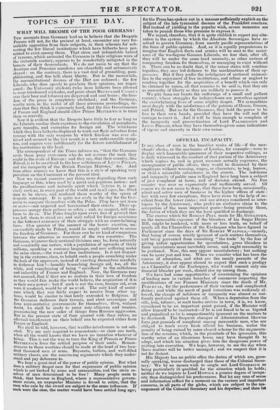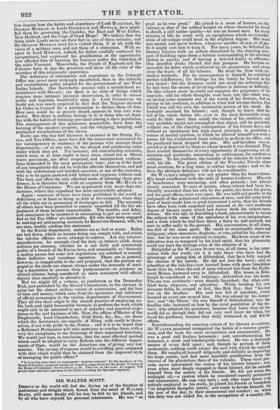OFFICIAL INCAPACITY.
IF any class of men in the humbler ranks of life—if the mer- chants' clerks, or the mechanics of London, for example—were to display such lamentable ignorance of their respective callings, as is daily witnessed in the conduct of that portion of the Aristocracy which aspires to, and in great measure actually engrosses, the management of public talks, they would be dismissed by their employers without warning, wages, or characters, to beg, borrow, or steal a miserable subsistence in the streets. The indolence and incapacity of public men in England have long been a subject of just complaint at home, and of derision abroad. No free country- was ever so expensively and inefficiently served. Of course we do not mean to deny, that there have been, occasionally, adroit and active men of business in the higher offices of state : but with very few exceptions, these have risen by the help of ac- cident from the lower ranks ; and are always considered as inter- lopers by the Aristocracy, who prefer an exclusive claim to the occupation of the more important posts—being precisely those, the duties of which they are the least qualified to discharge. The excuse which SIT ROBERT PEEL made for Mr. GOULBURN, on the memorable exposure of the blunders of his Sugar Duties Bill, might be tendered, with more or less truth, on behalf of nearly all the Chancellors of the Exchequer who have figured in Parliament since the days of Sir ROBERT WALPOLE,—namely, that being of course utterly ignorant of such matters themselves, and being prevented from consulting "time trade" by the fear of giving unfair opportunities for speculations, gross blunders in their calculations must inevitably occur, and ought reasonably to be pardoned. Now, this may appear unsatisfactory; but nothing can be more just and true. When we consider what has been the course of education, and what are the manly pursuits of the
• Aristocracy, it does appear absurd to expect that such a prodigy as a Chancellor of the Exchequer, who would commit only one financial blunder per week, should rise up among them.
We have had some opportunities of ascertaining the opinions of leading men in various branches of commerce respecting the qualifications of our Finance Ministers since the death of Mr. PERCEVAL. for the performance of their various and complicated
duties ; and while the merit of good intentions was uniformly al- lowed, the charge of indolence or incapacity was almost as uni- forml)' preferred against them all. When a deputation from the silk, iron, tobacco, or malt trades arrives in town, it is, we know, considered to be an important point gained, if the Minister will allow himself to be instructed—if he is not found to be as bigoted and prejudiced as he is unquestionably ignorant on the matters to be discussed. The frequent changes of Administration likewise form just grounds of complaint among mercantile men, who are obliged to teach every fresh official his business, under the penalty of being ruined by some absurd scheme for the augmenta- tion of' the revenue, which, in the plenitude of his ignorance, this worthy scion of an illustrious house may have thought fit to adopt, and which his situation gives him the dangerous power of putting into execution. We hope, however, to see the day when these matters will be better managed ; and we suspect that it is not far distant.
His Majesty has no public office the duties of which are, gene- rally speaking, worse discharged than those of the Colonial Secre-
tary.. We by no means wish to single out Lord GODERICH as
being particularly ill qualified for the situation which he holds; neither do we impute to Lord Howicx a greater degree of incapa-
city than distinguished his predecessors. But let any man of sense and information reflect for a moment on the various and important concerns, in all parts of the globe, which are subject to the Ma- nagement of the Colonial Secretary and his deputies; and then let him inquire how the habits and experismee of Lord BATHURST, Sir GEORGE MURRAY, or Lords Gonsascn and Howicit, have quali- fied them for governing the Canadas, the East and West Indies, New Holland, and the Cape of Good Hope? We believe that the three noble Lords never set their feet in any of these colonies; and Sir GEORGE MURRAY must have visited them, if at all, with the views of a military man, and not those of a statesman. With re- spect to Lord Howlett, indeed, his father candidly confessed his inexperience, but expressed his gratification at the opportunity now afforded him of learning his business under the tutorship of the noble Viscount. Meanwhile, the People of England and the Colonies have to pay the premium and incur all the risks of the
mistakes of this aristocratic apprentice. The deficiency of information and experience in the Colonial Office was never more strikingly manifested, than in the imbecile and contradictory policy adopted for the government of our West
Indian Islands. Our Secretaries possess only a second-hand ac- quaintance with Slavery ; yet there is no state of things which requires more intimate personal observation, in order to reason justly and legislate beneficially upon it. Lord GODERICH, we doubt not, was much surprised to find that the Negroes mistook his Order in Council for a proclamation to declare them all free. How men could be so grossly stupid, appears to him very won- derful. But there is nothing strange in it, to those who are fami- liar with the habits of thinking prevalent among a slave population. The consequences of this ignorance, meanwhile, have been the burning of the masters' property, and, the whipping, hanging, and multiplied wretchedness of the slaves.
Every one who has had business to transact in the Stamp, Ex- cise, and Tax-Offices, must have felt the annoyance occasioned by the incompetency or obstinacy of the persons who manage these departments,—or at any rate, by the absurd and perplexing rules under which they act. For instance, old executorship accounts, which were, or at least ought to have been, closed ten or fifteen years previously, are 'often reopened, and unimportant explana- tions demanded in the most peremptory tone; just as if the fault of any irregularity did not lie with the officials themselves, and not with the unfortunate and terrified executor, or son of the executor, who is to be again pestered with letters and expenses without end. The best, and often the only effectual mode of silencing these gen- tlemen, is to threaten them with an exposure from Mr. HUME in the House of Commons. We are acquainted with more than one instance, where this expedient has been successfully adopted.
Again : receivers of taxes have been published to the world as defaulters, or at least as being in debt to Government, when they all the while are in possession of discharges in full. The accounts of others have been permitted to remain unsettled till the fair ad-
justment of them became impracticable. The trouble, and delay, and annoyance to be sustained in attempting to get an error recti-
fied at the Tax Office" are intolerable. All who have been engaged in making out and passing accounts for Receivers-General, will, we are sure, readily confirm this statement. In the Excise department, matters are as bad or worse. Rules are laid down, which no human being can comply with, and which the inferior officers never attempt to enforce. Ask any tobacco- manufacturer, for example (and the duty on tobacco yields three millions per annum), whether he is not daily and notoriously guilty of a breach of the Excise-laws, and necessarily so? Scarcely a session passes but some new regulations are schemed to remedy their defective and vexatious operation. These are in general, however, so inapplicable to the end proposed, that the persons en- gaged in the trade are almost always under the necessity of send- ing a deputation to procure their postponement—to postpone an absurd scheme, being considered as more consistent with official dignity than manfully to abandon it. But we might fill a volume, as ponderous as the Doomsday
Book just published by the Record Commission, in the attempt to point out the almost endless variety of annoyances, and the loss of time and money, which arise from the ignorance and indolence of official personages in the various departments of Government. They all owe their origin to the absurd practice of employing no- ble lords and right honourable baronets to perform the work which ought only to be intrusted to men of industry and practical expe- rience in the real business of life. Now, the offices of Master of the Staghounds, Lord Chamberlain, Gold Stick, &c., &c., are those which the Aristocracy are capable of' filling with credit to them- selves, if not with profit to the Nation, and it is to be hoped that a Reformed Parliament will take measures to confine them, with a very few exceptions, to the discharge of their important functions. We would just hint, in conclusion, that the most effectual method which could be adopted to carry Reform into the different depart- ments of State, would be the American one of giving very low salaries. The saving of expense would be a trifling gain compared with that which would thus be obtained from the improved style of managing the public affairs.* • It is in this sense that we recommend "moderate salaries" for the members of the Board of Scrutiny, proposed among our remedial suggestions for the proper Working of The House of Commons—SUPPLEMENT, p. 20. That use of the term, we suspect, will puzzle those who have not been in the habit of reading the Spectator regularly. •



















































 Previous page
Previous page